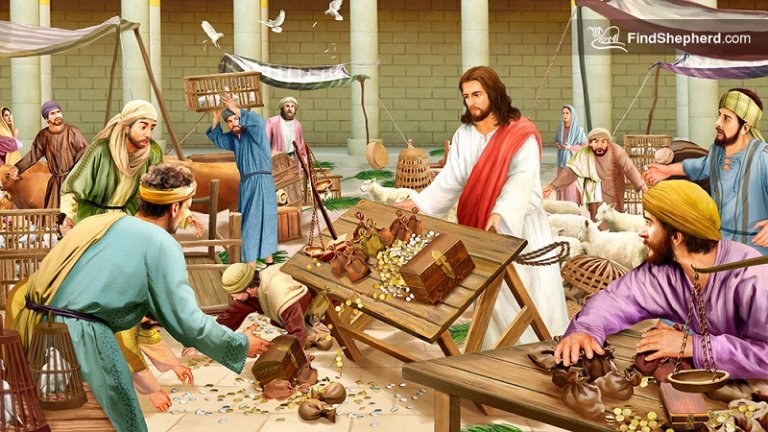Jesus did NOT Eat Meat. Go VEGAN! By Chapman Chen
Summary: Instances of Jesus eating meat or sanctioning meatism in the gospels are products of either misinterpretation or later interpolation (cf. Chen 2020). E.g., in the miracle of “five loaves and two fish,” Jesus broke loaves but not fish (Matthew 14). The Greek word for fish (ἰχθύας) was a code word for ” Jesus Christ, Son of God, Savior” (Akers 2000); and “fish” may also be a mistranslation of the Greek word for “fishweed” (Raw 2019).
Luke’s story of Jesus eating fish to prove to the eleven disciples at evening on the day of his Resurrection that he’s no ghost is clearly a forgery, for both the date and the venue contradict Mark and Matthew (cf. Vujicic 2016). Jesus did not eat lamb at Passover for he deliberately held the Last Supper before Passover (John 13). Jesus did not sanction meat-eating in Mark 7:15-19; there He merely concluded that God’s command is more significant than humans’ tradition, that evil thoughts rather than food taken without washing hands defile us (cf. Beer 2014; Chen 2021a).
Full Text: https://www.hkbnews.net/post/jesus-did-not-eat-meat-go-vegan-by-chapman-chen-hkbnews Amen!
Contrary to mainstream churches’ belief, Jesus Christ was vegan. Instances of Jesus eating meat or sanction meatism in the gospels are products of either misinterpretation or later interpolation.
1. Jesus Desires Mercy, not Sacrifice
In Matthew 9:13, Jesus admonished the Pharisees, “I desire mercy, not sacrifice”. Jesus’s natural brother, James the Just, is reported to have been vegan. “Who and whatever James was, so was Jesus.” (Eisenman 1997). Jesus cared about sparrows (Matthew 10:29), fowls (Matt. 6:26), lamb (John 13:6), sheep (Matt. 12:11), doves (Matt. 10:16), hens (Matt. 23:37), donkey (Matt. 21:7), mule(s) (Linzey and Dorothy 1998: 38-39 ;Linzey 2010: 60-61), asses and oxen (Luke 14:5), etc.
Jesus even died for animal liberation. In driving out from the Holy Temple those vendors who were buying and selling animals for cruel sacrifice (Matthew 21:12), Jesus disrupted the revenue stream of the chief priests and teachers of the law (Mark 11:18), and deeply offended them, resulting in his arrest, trial under Pontius Pilate, and crucifixion (Akers 2000).
2. Jesus Broke Loaves but NOT Fish (Matthew 14)
In the miracle of “Five loaves and two fish,” which is narrated in Matthew 14:13-21, Mark 6:31-44, Luke 9:12-17, and John 6:1-14, Jesus neither condoned the eating of fish nor gave it to the masses (Matthew 14). As pointed out by John Vujicic (2009), if you carefully read the text of Matthew 14, you will see that Jesus only broke the LOAVES and gave ONLY THE LOAVES to the people. Twelve baskets were filled with the broken pieces of BREAD. When Jesus made a remark concerning the feeding of five thousand and four thousand, he all along merely made reference to the LOAVES of BREAD AND THE BASKETS which held the broken pieces of bread. Jesus never mentioned in any way the fishes.
In St. John’s version even though reference is circuitously made to Jesus’s breaking of the fishes, the twelve baskets contained only the broken pieces of FIVE LOAVES. Obviously Jesus used only five loaves to feed the crowd and the reference to the fishes is a subsequent interpolation.
As put by Raw Matt (2019), “Even IF the manuscript is correct, the translation is erroneous.” As found by the author’s own research, in the Greek version of John 6:9, the word for “fish” is ὀψάριον (opsarion), a dried seaweed. “Undoubtedly dried fishweed would be more probable in a basket with bread, as fishweed remains a well-liked food amidst Jewish and Arab peasants akin to the group whom Jesus was addressing (Matt 2019).”
Moreover, according to Denis Giron (2013), this helps explain Matthew 4:18-20, where Jesus gets his first disciples by telling some fishermen to give up their profession and follow him. Jesus even says to them “I will make you a fisher of men”. Could this be Jesus was having them give up their barbaric line of work to do something more righteous? It may sound absurd, but it starts to make a little more sense when you take it in the same context as the story of feeding five thousand, where the disciples never even considered trying to catch some fish, despite being beside the sea. Why didn’t they go fishing? Did Jesus teach it was wrong to eat fish?
A noteworthy observation concerning the fish symbol: The Greek word for fish (ἰχθύας/Ichthys) was an acronym or code word for ” Ἰησοῦς Χρῑστός Θεοῦ Υἱός Σωτήρ [Jesus Christ, Son of God, Savior]”, popular among early Christians for the sake of avoiding persecution (cf. Akers 1989; Regenstein 1991; Altar n.d.). And in the Greek version of Mark 6:41, Matthew 14:19, and Luke 9:16, the word for fish as in “the five loaves and two fish” is none other than ἰχθύας!
3. Jesus Eating Meat after Resurrection is Fake News!
Luke’s story of Jesus eating fish to prove to the eleven disciples at evening on the day of his Resurrection that he’s no ghost is clearly a forgery, for both the date and the venue contradict Mark and Matthew.
Luke 24: 39-43 and John 21:1-14 are the only places in the New Testament that mention Jesus eating meat. According to Luke, Jesus ate fish (ἰχθύος/Ichthys) in front of 11 disciples in Jerusalem on the first night of his Resurrection: “Behold my hands and my feet, that it is I myself: handle me, and see; for a spirit hath not flesh and bones… And while they yet believed not for joy, and wondered, he said unto them, Have ye here any meat? And they gave him a piece of a broiled fish, and of an honeycomb. And he took it, and did eat before them.” (Luke 24: 39-43 KJV)
However, according to the Gospel of Mark 16: 7 and 14:28, Jesus had long told his disciples that he would go to Galilee upon resurrection. According to Mark 16: 9 -19, Jesus revealed himself thrice after resurrection, the first time to Mary Magdalene; the second time to two disciples on their way to Emmaus; the third time to all the 11 disciples. According to Matthew 28:16, the eleven disciples went up a mountain in Galilee as specified by Jesus, where Jesus met them the first time as well as the last time after He rose from the dead. So the Gospel of Luke’s claim that Jesus ate fish in front of the disciples in Jerusalem on the very night of his Resurrection is wrong in terms of both date and venue. Apparently, it is fabricated and not to be believed (cf. Vujicic 2016).
Similarly, the report of John 21 cannot be right and Peter accompanied by several of his fellow disciples could not have been catching fish after Jesus’ rise from death. Jesus did not supply fish to his disciples because that showing up, in accordance with Matthew’s and Mark’s account, never occurred. (Interestingly, the word in the Greek version for fish as in John 21:13 is ὀψάριον [opsarion], which as mentioned earlier, could refer to a dried Mediterranean seaweed.) John, in the vein of Luke, alleges that Jesus’ foremost showing up occurred in the evening of the first day, while the door was barred where the disciples were grouped together. John asserts that this was the earliest showing up and that Thomas was absent.
Seven days after, Jesus purportedly showed up to his disciples again while Thomas was there, too. This fails to concur even with Luke because he says that all eleven disciples were there when Jesus manifested himself to them in the Holy City (cf. Vujicic 2016).
Also, as aformentioned, fish (Ichthys) was a well known mystical symbol amidst these early Christians for “Jesus Christ, Son of God, Savior” (Akers 1989; Regenstein 1991). Given how the early Christians employed the term, there is therefore good historical evidence for the argument that all of the “fish stories” that managed to get into the gospels were intended to be taken symbolically rather than literally.
4. Jesus would not Like you to Eat Lamb on Easter
It is explicitly recorded in the Gospel of John that Jesus deliberately held the Last Supper before Passover. “Now before the feast of the Passover, when Jesus knew that his hour was come that he should depart out of this world unto the Father… he loved them unto the end. And supper being ended, the devil having now put into the heart of Judas…to betray him” (John 13: 1-2 KJV).
“Then led [the Jewish leaders] they Jesus from Caiaphas unto the hall of judgment: and it was early; and they themselves went not into the judgment hall, lest they should be defiled; but that they might eat the Passover” (John 18:28 KJV).
According to the Gospel of the Ebionites, Jesus resolutely refused to eat lamb in the Passover. The disciples asked him, “Master, where would you like us to arrange the Passover meal?” “I simply don’t want to eat lamb with you in the Passover!” replied Jesus. And during the Last Supper, Jesus blessed wine and bread, NOT meat.
5. Jesus did NOT Purge All Meats
Jesus “Purging all meats” (Mark 7:19 KJV) or “(…Jesus declared all foods clean)” (Mark 7:19 NIV) must be an interpolation or later remark.
5.1 The Bible Verses Concerned:
15 There is nothing from without a man, that entering into him can defile him: but the things which come out of him, those are they that defile the man…18 And he saith unto them, Are ye so without understanding also? Do ye not perceive, that whatsoever thing from without entereth into the man, it cannot defile him; 19 Because it entereth not into his heart, but into the belly, and goeth out into the draught, purging all meats? (Mark 7 KJV)
The counterpart of Mark 7:19 in NIV is: “For it doesn’t go into their heart but into their stomach, and then out of the body.” (In saying this, Jesus declared all foods clean.)”
5.2 “Jesus declared all foods clean” as a Later Addition
The declaration in parenthesis can only found in certain versions like NIV, which came into existence after the King James Version, one of the earliest English translations of the Holy Bible. The earliest available Greek Manuscripts as shown in Biblehub do not contain it. So it must be a remark added by later scribes or translators (cf. Bbvulf 2013).
5.3. “purging [καθαρίζων] all [πάντα] the [τὰ] food [βρώματα]?”
5.3.1. Grammatical Discordance
As pointed out by Beer 2014, “purging” (καθαρίζων) is a participium (which functions as the verb of the clause), whereas “he said” (λέγει) is an indicative verb. “And He [Jesus] said to them…[Jesus is] cleansing all the foods” “would not make sense grammatically.”
5.3.2. Punctuation Problem
According to Metzger (1964:26-27), the early papyri as well as the uncial manuscripts have “only an occasional mark of punctuation”, and the sign of interrogation (question mark) “is rarely found before the ninth century” (Metzger 1964:27).
As argued by Beer 2014, “the least we can deduce from the texts with punctuation is that later scribes (copyists)” attempted to signify that the phrase “purging καθαρίζων all πάντα the τὰ food βρώματα” should be set apart from the remaining of the sentence. This could mean: “the phrase is not part of Jesus’ question to his followers, but rather an editorial note by Mark”.
5.4. Context
More importantly, the context is some Pharisees criticizing Jesus’ disciples for failing to wash their hands ritualistically before eating bread. The conversation is centered around whether one should hold the tradition of the elders and always wash one’s hands before eating. And Jesus’ conclusion is: God’s command is more significant than men’s tradition, and evil thoughts rather than food taken without washing hands defile us. Here, Jesus is not saying that we can eat any kind of unclean food or animal flesh ; he is not repealing the Kosher code (cf. Beer 2014).
Bibliography
Akers, Keith (2000). The Lost Religion of Jesus. Lagos: Lantern Books.
Altar, Ted (n.d.). “Did Christ at Least Eat Fish?” Ivu. org. (https://ivu.org/history/christian/christ_veg.html)
Bbvulf (2013). “Did Christ declare all foods clean? Misunderstandings regarding Mark 7:19” (https:// biblethingsinbibleways. wordpress. com /2013/05/12/did-christ-declare-all-foods-clean-misunderstandings-regarding-mark-719/)
Beer, JM de (2014). “Did Jesus Really Declare All Food Clean?” (https://www.academia.edu/38821408/DID_JESUS_REALLY_DECLARE_ALL_FOOD_CLEAN)
Chen, Chapman (2021a). “Did Jesus Declare All Foods Clean? Go Vegan!” HKBNews, Aug. 30 (https://www.hkbnews.net/post/did-jesus-declare-all-foods-clean-go-vegan-by-chapman-chen-hkbnews)
Chen, Chapman (2021b). “The Forbidden Fruit of Eden is Meat. Go Vegan!” HKBNews, Aug. 18 (https://www.hkbnews.net/post/the-forbidden-fruit-of-eden-is-meat-go-vegan-by-chapman-chen-hkbnews).
Chen, Chapman (2021c). “Which One was Vegan? Cain or Abel?” HKBNews, July 27 (https://www.hkbnews.net/post/which-one-was-vegan-cain-or-abel-by-chapman-chen-hkbnews)
Chen, Chapman (2021d). “Does Dominion in Genesis Mean Stewardship or Despotism?” HKBNews, July 12 (https://www.hkbnews.net/post/does-dominion-over-animals-in-genesis-mean-stewardship-or-despotism-go-vegan-by-chapman-chen)
Chen, Chapman (2021e). ”Jesus Asks us to Serve the Animals. Go Vegan!” HKBNews, July 10 (https://www.hkbnews.net/post/jesus-asks-us-to-serve-the-animals-go-vegan-by-chapman-chen-hkbnews)
Chen, Chapman (2021f). “Does Genesis Prescribe a Vegan Diet or a Meat Diet?” HKBNews, June 17 (https://www.hkbnews.net/post/does-genesis-prescribe-a-vegan-diet-or-a-meat-diet-by-chapman-chen-hkbnews )
Chen, Chapman (2021g). “Follow Christ’s Words n Love your Neighbors, includ. Animals.” HKBNews, June 15 (https://www.hkbnews.net/post/follow-christ-s-words-n-love-your-neighbors-includ-animals-go-vegan-by-chapman-chen-hkbnews )
Chen, Chapman (2021h). “Jesus Heals a Mule:- A Coptic Bible Story. Go Vegan!” HKBNews, 28 Aug. (https://www.hkbnews.net/post/jesus-heals-a-mule-a-coptic-bible-story-go-vegan-by-chapman-chen-hkbnews)
Chen, Chapman (2020). “Proofs that Jesus was Vegan.” HKBNews, Dec. 28 (https://www.hkbnews.net/post/proofs-that-jesus-was-vegan-%E6%85%88%E6%84%9B%E8%80%B6%E7%A9%8C%E9%A3%9F%E5%85%A8%E7%B4%A0-by-chapman-chen-hkbnews )
Dixon, Brad (2018). “Was Jesus a Vegetarian?” Everfit, Apr. 11. (https://www.everfit.co.nz/articles/jesus-kick-arse-animal-rights-activist)
Erwin, Jane (2010). “The Real Forbidden Fruit is Meat”. Ogden: Sunstone 2011 Utah Symposium and Workshops, August 6. (https://www.youtube.com/watch?v=7EBfPhSJFXE&t=2750s)
James, Montague Rhode (1924). The Gospel of the Ebionites in The Apocryphal New Testament. Oxford: Clarendon Press, pp. 8-10. (http://www.earlychristianwritings.com/text/gospelebionites.html)
Linzey, Andrew (1994). Animal Theology. Champaign: University of Illinois Press.
Linzey, Andrew (2007). Creatures of the Same God — Explorations in Animal Theology. Winchester: Winchester UP.
Matt, Raw (2019). “What does the Bible have to say about diet? Part 1”. Imalovebug. com, Jan. 17. (https://imalovebug.com/blogs/blog/what-does-the-bible-have-to-say-about-diet)
Ouseley, Gideon Jasper Richard, ed. (1904). The Gospel of the Holy Twelve. (http://www.thenazareneway.com/ght_table_of_contents.htm)
Regenstein, Lewsi (1991). Replenish the Earth: The History of Organized Religion’s Treatment of Animals and Nature. New York: Crossroad Pub Co.
Rosen, Steven (1987). Food for the Spirit: Vegetarianism and the World Religions — Including the Bible’s Message of Conservation and Kindness toward Animals.
Saba (2006). The Lord Christ Jesus was a Vegan. Bloominton: AuthorHouse.
Vujicic, John (2016). “Yahweh Conspiracy: Deception of the Ages Unveiled”. (https://www.all-creatures.org/discuss/didjesuseatfish-jv.html)
York, Tripp and Alexis-Baker, Andy, eds. (2012). A Faith Embracing All Creatures. Eugene: Cascade Books.
———————————————
-------------------------------------------------支持《多聞》眾籌計劃,我們目標是集資12萬加元,這筆錢遠不夠在報紙買頭版,但可支持《多聞》抗共2年!
Bank interact 課金給《多聞》:tohk928@gmail.com
Subscribe us in:
Telegram Channel:
https://t.me/tohknews
Facebook:
https://www.facebook.com/多聞-117598966317804
Twitter:
https://twitter.com/TOHKNEWS
Reddit:
https://www.reddit.com/user/TOHKnews
Share this article to:




